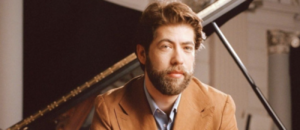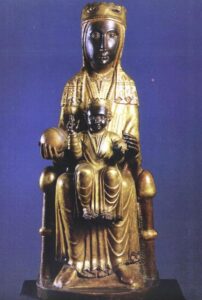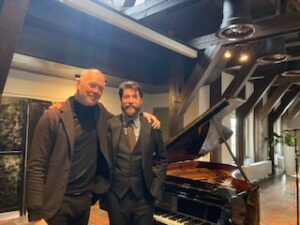
Thomas Beijer played the world premiere of the piece I wrote especially for him, The Pilgrim’s Progress, on 26 March in the series of Slot Concerts at Slot Zeist. The programme included Schubert’s Moments Musicaux, Falla’s El Amor Brujo and Chopin’s 3rd sonata, op. 58. My piece still has two movements – perhaps a third and final movement will be added. The work is based on melodies from the Llibre Vermell.
Knowing Thomas’ love of Iberian, I chose this collection of melodies from the Catalan monastery of Montserrat as an important starting point – and because they are beautiful tunes that, moreover, were once the first ‘Early Music’ I heard. They are now ‘standards’ of medieval musical practice. The collection was intended to put edifying lyrics in the mouths of the elated pilgrims, when they finally reached the Black Madonna in the high monastery, so that their wild dances would still retain the appropriate sacred character…
In my pieces, the pilgrims’ arduous journey up the mountain becomes a long look back through history, in which we leave the present in oblivion and enter a land of strange beauty that may never have been ours, but which we now want to embrace by all means available to us these days.

My image in the first part was that of sweating zealots who made their way up the mountain singing and stumbling… A holy fire drove them, sucked in as they were by the symbol of purity and unworldly love and beauty they expected to find above. A hopeful joy at this opportunity for redemption now moves their feet to dance, they throw their heads into their necks and then simultaneously experience the solemn ringing of the bells and the silence of the monastery walls and what lies beyond. They feel their own sinfulness heavily and sing loudly to cast it off.
The sight of the Madonna opens up a new and unprecedented feeling of awe and gives access to a strange world of holy silence that makes the outer dance unnecessary…
The second movement (with a title borrowed from Beckett) is a strange memento mori, addressed to all who seek high holiness, even that humble holiness of the Child on the Madonna’s lap. The almost childlike song to the Virgin is repeatedly ominously interrupted by the tune of Ad mortem festinamus (‘we hasten to our death’), which keeps popping up in all kinds of guises (from Mozart to McCoy Tyner) and gradually gains the upper hand until only a warning finger remains.
Now that Thomas has these two movements under his belt, I also feel a third, concluding movement coming up in my head – who knows.
Thomas expressed enthusiasm for the idea.
Unfortunately, new music is not always good for young master pianists’ careers…
Nevertheless, Thomas wants to include the piece in upcoming recitals, so ‘we’ll see’.
In any case, it was a wonderful concert – Thomas is a true master pianist who uses the piano to lead us deep, and even deeper, into the music.

Thomas and Willem Wander